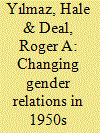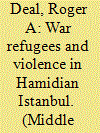| Srl | Item |
| 1 |
ID:
180038


|
|
|
|
|
| Summary/Abstract |
This article examines patterns of gender relations in Ankara in the early 1950s. Based in part on the unpublished memoirs of Kemal Tanyolaç, who provided extensive details of his bachelor years in Ankara, this article explores a wide variety of relationships between men and women, from traditional marriage-oriented matchmaking and modern dating, through business relationships as work colleagues or landlord and tenant, to different types of illicit sexual relations. We look at changes in how men and women viewed each other and their relationships, and what effects that had on the ongoing social changes of the time. We argue that all types of relationships and the possibilities they entailed, including prostitution, need to be understood in complex, nuanced ways in order to understand the society that was emerging in post-Second World War urban Turkey.
|
|
|
|
|
|
|
|
|
|
|
|
|
|
|
|
| 2 |
ID:
121466


|
|
|
|
|
| Publication |
2013.
|
| Summary/Abstract |
This paper examines the place of war refugees in patterns of interpersonal violence in Istanbul in the 1890s. I argue that refugees, especially from the 1878 Russo-Turkish war, committed a disproportionate amount of criminal violence, and that their violent acts were often more extreme than those of other groups. I argue that factors such as poverty are insufficient to explain the degree of difference from the patterns of the general population. It is also necessary to look at an important cultural factor that most of these refugees share: exposure to and experience of violence. The conflicts from which the subjects of my paper were fleeing were particularly brutal ones, and thus could be expected to have a particularly brutalizing effect.
|
|
|
|
|
|
|
|
|
|
|
|
|
|
|
|